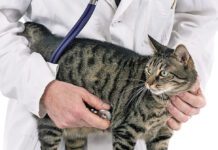Scan the cat treats in your grocery store, and youll find lots of crunchy nuggets intended to help prevent the buildup of tartar on your cats teeth and therefore help reduce the risk of periodontal disease. But just how effective are these products? Although manufacturers of snack foods for cats have claimed dental benefits, most are unsubstantiated, says Eric Davis, DVM, of the dental referral service at the Cornell University Hospital for Animals.
Tartar buildup depends on many factors including the abrasiveness of the cats food, the chemical composition of your cats saliva, and the bacterial population in your cats mouth. The latter two can vary from cat to cat. Most of the products for tartar control are available at grocery and pet stores, and manufacturers suggest you give your cat from nine to 24 treats a day based on his weight. Mix them with your cats dry food portion so he doesnt take in too many extra calories.
Important ingredients
For the purposes of this article, we looked at Whisker Lickins Tartar Control Crunchy Cat Treats and Right Bites Bones & Teeth Formula Healthy Treats for Cats, both Purina products, and Pounce Tartar & Plaque Control Crunchy Chicken Flavor Treats, which is made by Heinz. Although most cats enjoy the taste of these tartar treats, which come in a variety of flavors, they contain ground yellow corn meal and wheat flour as two of the first three ingredients listed.
None of the three contain any of the common ingredients listed in dentifrice products, says Davis, who is a fellow of the Academy of Veterinary Dentistry. Dentifrice products include ingredients such as lactoperoxidase and glucose oxidase, chlorhexidine, zinc, ascorbate, flouride, and silicates, all of which perform a variety of functions such as killing bacteria, retarding plaque, hardening enamel, and acting as a mild abrasive.
Eating dry food is generally more effective than eating canned food in preventing the buildup of plaque and tartar, but even dry cat food eventually leads to their accumulation. Dry cat food starts out like cookie batter and then is baked into shapes. It would be comparable to people eating pretzels every day, and never brushing their teeth, says Davis.
Dry dental diets are a better way to help prevent the buildup of tartar than tartar snacks. Dental diets are manufactured differently than regular commercial cat foods. The kibble is larger, which requires the cat to chew it into smaller pieces to swallow, says Davis. The kibble contains abrasive fibers that are arranged horizontally like Shredded Wheat, and it is the fibers that help clean the teeth surfaces as the cat chews the food.
Studies have shown that dental diets such as Hills Feline t/d and Friskies Dental Diet, the only two foods currently approved by the Veterinary Oral Health Council, the organization that independently reviews claims made by manufacturers regarding the effectiveness of dental products, can aid in the prevention of tartar buildup by 25 percent, compared to regular commercial cat foods.
The same abrasive fibers found in the dental diets listed above are lacking in the tartar treats. I could not discern any fiber stratification, and when I punctured pieces of each treat with a knife point, all three broke apart, says Davis.
Limitations
Feeding your cat tartar treats or dental diets wont replace regular teeth cleaning. Dental diets and tartar chews have limitations, says Davis. Only the back teeth are involved in this chewing activity, and the incisor and canine teeth receive no benefits from these products. Secondly, they must be chewed in order to work effectively. Cats that swallow the dental diets whole, without chewing, receive no benefit from use of these products.
To make sure your cat maintains good dental health, have his teeth cleaned regularly by your veterinarian. In between cleanings, brush your cats teeth daily with a brush and toothpaste intended for cats.



